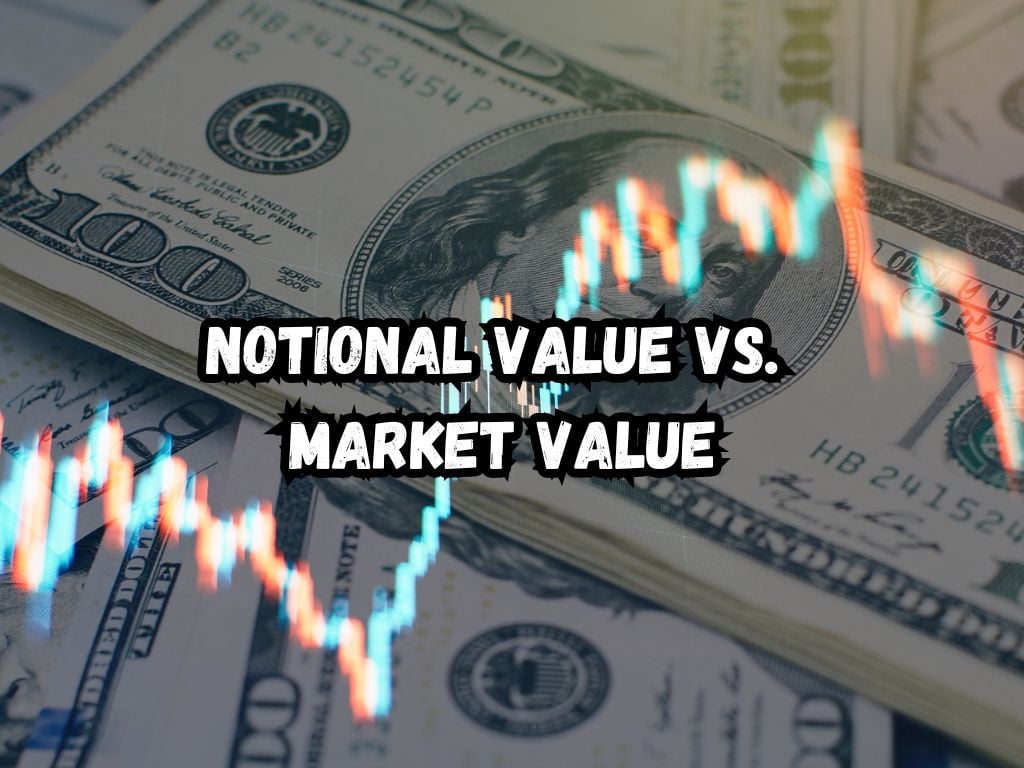Investing in financial markets requires an in-depth understanding of various core concepts, among which notional value and market value stand out.
These concepts are not just important for investors and traders but are also critical when it comes to making strategic financial decisions that can impact businesses and individual portfolios.
Grasping the distinction between notional value vs market value is pivotal for anyone involved in financial proceedings, be it in the dealings of stocks, real estate, or complex derivative instruments.
Understanding Notional Value
Notional value refers to the total worth of a financial instrument’s position. It’s a term often used in the context of derivatives and leveraged products. For instance, if you hold a contract for oil futures that covers 1,000 barrels of oil at a price of $50 per barrel, your contract would hold a notional value of $50,000.
This value is crucial as it paints a picture of scale or volume in trades, which is especially relevant when you’re evaluating the positions in complex portfolios.

Application of Notional Value
The notional value shows its importance in the reach of derivatives markets. If a trader opts for an options contract, the notional value can give an idea of the leveraged exposure the trader is taking.
Similarly, in the realm of swaps, the notional amount is the baseline upon which swap payments are calculated. This value forms the backbone of the risk management process; it’s essential in measuring the overall exposure an investor or institution maintains across varying transactions.
The need for understanding notional value resides in the complexity of derivatives and the level of leverage it embodies. It doesn’t indicate the amount at risk, but rather the volume of business or the scale of the trade.
Understanding Market Value
Opposite to notional value, market value is the price at which an asset would trade in the current market. It is the real-time value of an asset, determined by the forces of supply and demand among investors.
If you consider the stock of a company trading on an exchange, its market value is reflected by the ongoing stock price multiplied by the number of shares outstanding.
Application of Market Value
The concept of market value extends to various assets, including real estate, artwork, and traded securities. It’s the figure you’ll often encounter when you’re looking to buy or sell an asset. Market value fluctuates based on economic conditions, market sentiment, and underlying fundamentals of the asset.
For investors, understanding the market value is instrumental in making informed decisions when entering or exiting a position.
In investment analysis, market value serves as a temperature check of an asset’s health in the market. It allows investors to assess whether an asset is undervalized or overvalued by the market.
Notional Value vs Market Value
While notional value sets the stage for understanding the broader reach of a financial position, market value focuses squarely on the current, actionable trading price of an asset.
Market value is tangible; it’s what you pay or receive in the market. Conversely, notional value is more theoretical, representing possible revenue in a leveraged position and often relating to assets that are not owned outright.
Take, for example, a mortgage-backed security. Its market value is what you could sell it for in the market today, whereas its notional value would reflect the total underlying mortgage loans it represents. Notional is about the “what-if” while market is about the “what is”.
Significance in Financial Markets
Both notional and market values hold their ground in financial decision-making. Traders and portfolio managers must balance the two to understand the full picture of assets they are dealing with, which can range from plain vanilla stocks to more complex swaps or futures contracts.
The notional value can signal the level of leverage taken in a portfolio, which bears its own set of risks. Market value, meanwhile,allows for a snapshot of an asset’s liquidity and current standing.
Moreover, they can both be reflected in financial reporting, where companies must declare the fair market value of their assets and the notional value of their derivative holdings.

Practical Implications for Investors
Understanding notional and market values has a direct link with investors’ returns and risk profile. Identifying the market value of an asset helps in determining its entry and exit points, which is critical to maximizing returns.
Meanwhile, being aware of the notional value can aid in appreciating the underlying risks in leveraged positions.
Investors who are strategic about managing their portfolios often adjust their investment vehicles based on the current market and notional values.
Knowing when and how much exposure to take can make the difference between substantial gains or considerable losses.
Frequently Asked Questions
How does notional value affect leverage?
Notional value affects leverage by indicating the actual volume of trades or investments made using borrowed funds. Higher notional values generally mean higher leverage, increasing both potential returns and potential risks.
Can market value fluctuate widely over a short period?
Yes, market value can change rapidly due to factors such as economic news, investor sentiment, or changes in business fundamentals. Such volatility is particularly common in stock and cryptocurrency markets.
How do changes in notional value impact derivative contracts?
Changes in notional value can impact payment obligations under derivative contracts. For instance, in an interest rate swap, if the notional value changes, it can alter the swap payments’ amounts.
Why is understanding market value essential for real estate investments?
For real estate, market value determines the price at which a property can be bought or sold. It helps investors to gauge the property’s worth at the current market rate and to negotiate a fair price.
Is notional value relevant in the context of non-derivative financial instruments?
Non-derivative instruments typically do not use the concept of notional value, as there isn’t the same element of leverage or underlying asset volume as seen in derivatives.
Conclusion
In the financial market ecosystem, notional value and market value are among the firmament of concepts that guide the hands of investors and traders.
They serve different purposes, with the former providing a boundary to the leverage and scale of a position and the latter setting the immediate value of assets.
A complete understanding of both values empowers financial decisions, enabling individuals and businesses to navigate markets with a clearer vision. It’s this clarity that often distinguishes savvy investors from novices, tying into the broader strategy of investment and risk management.


 Tags:
Tags:










